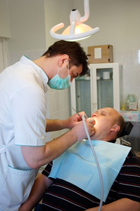 Each of our teeth is secured firmly to the jaw bone by one or more roots which contain a mass of blood vessels and nerves otherwise called the pulp. A root canal treatment is done when this pulp gets infected by microorganisms; this can happen when there is sudden trauma or injury to the tooth or due to tooth decay or cavity which is left untreated. Sometimes the pulp also gets infected when the tooth filling has cracked or fallen off due to wear and tear.
Each of our teeth is secured firmly to the jaw bone by one or more roots which contain a mass of blood vessels and nerves otherwise called the pulp. A root canal treatment is done when this pulp gets infected by microorganisms; this can happen when there is sudden trauma or injury to the tooth or due to tooth decay or cavity which is left untreated. Sometimes the pulp also gets infected when the tooth filling has cracked or fallen off due to wear and tear.
In a typical root canal procedure, the tooth pulp is removed completely and the gap is filled with an inert material to prevent chances of any future infection. Following this therapy, the tooth becomes dead as it does not contain any blood vessels and nerves. The advantage of this procedure is that this is the only way by which you can retain the original tooth. The only other way to stop the spread of infection to the other teeth is by extracting the infected tooth which is not advisable. It is always best to retain all the natural teeth for optimum oral health and tooth extraction should only be considered as a last resort.
Root canal therapies are a little expensive as the procedure is complex, labour and time intensive. It would approximately cost three hundred dollars for a single root and can increase depend on the number of roots and other complications involved. In addition, you may also have to spend for medications and dental X-ray. In spite of the costs, it is very important to undergo this treatment as an infected tooth pulp can cause extreme pain and if not treated immediately can affect the other teeth too. So, it is best if a root canal treatment is done right at the beginning as soon as you feel pain or notice the symptoms.
Do not think of this procedure as a cosmetic one; it is indeed necessary to maintain good oral health and hygiene.





 When a tooth becomes infected as the result of dental decay, the body responds by producing excess white blood cells to fight the infection. This combines with the infected matter to form a substance called pus, which can often build up in the tooth and in the softer gum tissue around the root. This leads to a swelling called a tooth abscess, which is very sensitive and often very painful.
When a tooth becomes infected as the result of dental decay, the body responds by producing excess white blood cells to fight the infection. This combines with the infected matter to form a substance called pus, which can often build up in the tooth and in the softer gum tissue around the root. This leads to a swelling called a tooth abscess, which is very sensitive and often very painful. When a tooth becomes infected in its root, it becomes necessary to remove the root in order to save the tooth and prevent the spread of infection. This process is called a root canal treatment and involves completely removing the infected pulp at the centre of the tooth that may be causing severe pain and greatly affecting your dental and general health. Occasionally a root canal can be used to treat a tooth abscess where the abscess is a result of a greater infection.
When a tooth becomes infected in its root, it becomes necessary to remove the root in order to save the tooth and prevent the spread of infection. This process is called a root canal treatment and involves completely removing the infected pulp at the centre of the tooth that may be causing severe pain and greatly affecting your dental and general health. Occasionally a root canal can be used to treat a tooth abscess where the abscess is a result of a greater infection.

